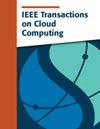针对地理分布式 Kubernetes 集群联盟的聚合监控
IF 5
2区 计算机科学
Q1 COMPUTER SCIENCE, INFORMATION SYSTEMS
引用次数: 0
摘要
分布式监控是一项基本功能,它允许大型集群联合在一组可用的地理分布式资源上有效地调度应用程序。但是,定期报告每个可用服务器的精确状态对于实现精确的调度是不必要的,而且当服务器数量增加时也无法进行扩展。本文提出了Acala,这是一个用于地理分布式Kubernetes集群联合的聚合监控框架,旨在为管理集群提供有关整个集群而不是单个服务器的聚合信息。基于在地理分布式网格5000测试平台受控环境下的实际部署,我们的评估表明,在单个成员集群实验中,Acala将跨集群网络流量减少了97%,将抓取持续时间减少了55%。在多成员集群场景中,我们的解决方案还可以将跨集群的网络流量减少95%,内存资源消耗减少83%。通过对有数据聚合和没有数据聚合的调度效率的比较表明,数据聚合对系统调度功能的影响最小。这些结果表明,我们的方法优于现有的解决方案,适合处理大规模地理分布式Kubernetes集群联合环境。本文章由计算机程序翻译,如有差异,请以英文原文为准。
Aggregate Monitoring for Geo-Distributed Kubernetes Cluster Federations
Distributed monitoring is an essential functionality to allow large cluster federations to efficiently schedule applications on a set of available geo-distributed resources. However, periodically reporting the precise status of each available server is both unnecessary to allow accurate scheduling and unscalable when the number of servers grows. This paper proposes Acala, an aggregate monitoring framework for geo-distributed Kubernetes cluster federations which aims to provide the management cluster with aggregated information about the entire cluster instead of individual servers. Based on actual deployment under a controlled environment in the geo-distributed Grid’5000 testbed, our evaluations show that Acala reduces the cross-cluster network traffic by up to 97% and the scrape duration by up to 55% in the single member cluster experiment. Our solution also decreases cross-cluster network traffic by 95% and memory resource consumption by 83% in multiple member cluster scenarios. A comparison of scheduling efficiency with and without data aggregation shows that aggregation has minimal effects on the system’s scheduling function. These results indicate that our approach is superior to the existing solution and is suitable to handle large-scale geo-distributed Kubernetes cluster federation environments.
求助全文
通过发布文献求助,成功后即可免费获取论文全文。
去求助
来源期刊

IEEE Transactions on Cloud Computing
Computer Science-Software
CiteScore
9.40
自引率
6.20%
发文量
167
期刊介绍:
The IEEE Transactions on Cloud Computing (TCC) is dedicated to the multidisciplinary field of cloud computing. It is committed to the publication of articles that present innovative research ideas, application results, and case studies in cloud computing, focusing on key technical issues related to theory, algorithms, systems, applications, and performance.
 求助内容:
求助内容: 应助结果提醒方式:
应助结果提醒方式:


